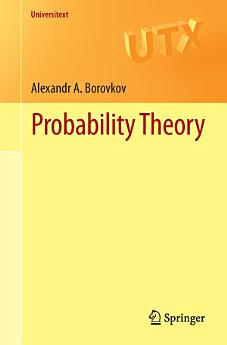Probability Theory
អំពីសៀវភៅអេឡិចត្រូនិកនេះ
The importance of the Russian school in the development of probability theory has long been recognized. This book is the translation of the fifth edition of the highly successful Russian textbook. This edition includes a number of new sections, such as a new chapter on large deviation theory for random walks, which are of both theoretical and applied interest. The frequent references to Russian literature throughout this work lend a fresh dimension and make it an invaluable source of reference for Western researchers and advanced students in probability related subjects.
Probability Theory will be of interest to both advanced undergraduate and graduate students studying probability theory and its applications. It can serve as a basis for several one-semester courses on probability theory and random processes as well as self-study.




